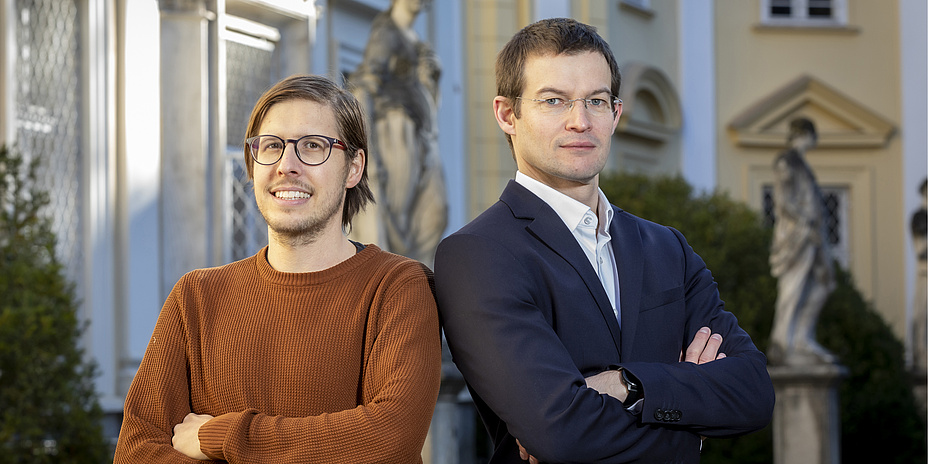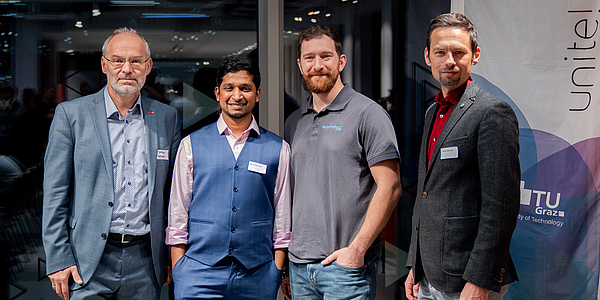Enzyme Research Between Cholera and Targeted Design

Enzymes that make pathogenic bacteria “invisible”
Daniel Kracher actually comes from a background in food and biotechnology, but discovered his love of biochemistry and enzymes early on during his studies while working intensively in the laboratory. “I worked with enzymes that we didn’t know much about,” he says looking back. These enzymes enable fungi to break down biomass more efficiently – a process that is not yet fully understood. “I really had to dig into this research to gain insights. That’s how I got hooked.”
After his studies in Vienna and stays in Norway and Manchester, the 38-year-old came to TU Graz, where he has worked as a university assistant and is involved in teaching: “This is a great broadening of my duties, very fulfilling and exciting.”
For the Young Researchers Group, he has, as he says himself, taken on a very “courageous” project. It deals with a combination of biochemistry and infection biology. Certain enzymes enable pathogenic organisms to “hide” virtually from the immune system of humans and animals and thus infect the host extremely effectively. It is not yet known exactly how this works. “These enzymes show a high similarity to those enzymes that are also responsible for biomass degradation in fungi and bacteria. But they have evolved in a different way and may have a completely different function in these organisms.” Together with infection biologist Stefan Schild from the University of Graz, who will conduct the tests on the pathogen itself, Kracher wants to get to the bottom of this phenomenon using the cholera pathogen. His goal? “If we could selectively switch off these proteins, then we could make the pathogen recognizable to the immune system at a very early stage and thus be able to fight it.” Incidentally, the enzyme is not only found in the cholera pathogen, but also in the plague and legionella pathogens, among others.
In the Young Researcher Groups, the university cooperation BioTechMed-Graz supports outstanding and promising post-docs to establish and consolidate an independent research group. The competition was held for the first time in 2019 and was won by biotechnologist Anita Emmerstorfer-Augustin from Graz University of Technology (TU Graz).
Proteases – targeted protein “scissors”
36-year-old biochemist Horst Lechner is mainly interested in protein design and catalysis – changing the properties of enzymes. An enzyme consists of individual building blocks, the 20 amino acids. “Basically, it looks like a string of pearls that has been folded up in a certain pattern,” explains the young researcher. In the middle there is a binding site, i.e. a small pocket, to which a suitable molecule docks and is then converted there. A chemical reaction is catalysed in this binding pocket. “But if you need a certain enzyme for a particular reaction and you have a molecule that doesn’t fit into its binding site, then that’s a problem.” This is a problem that can occur in the production of medicines, for example. By means of targeted enzyme design, the enzyme could now be modified until the molecule can bind. However, caution is advised, since “The folding of the amino acid chain gives the enzyme its function. If it is altered too much, then the enzyme is destroyed.” Horst Lechner now wants to take a new approach and transplant a suitable binding site from one enzyme to another. “We have a specific application in mind,” he says. “Special enzymes, certain proteases, can recognize particular sequences in an amino acid chain and cut the chain according to this sequence. For certain applications, however, it is necessary that the amino acid sequence is recognized but cut up beforehand.”
Originally, Lechner would have been drawn to a completely different field besides biochemistry – mechanical engineering. At second glance, however, it is more similar to biochemistry than suspected: “I like to tinker with things – and now I’m tinkering with enzymes. They’re kind of machines that make chemical reactions.”
This research area is anchored in the Field of Expertise “Human & Biotechnology”, one of five strategic foci of TU Graz.
You can find more research news on Planet research. Monthly updates from the world of science at Graz University of Technology are available via the research newsletter TU Graz research monthly.




